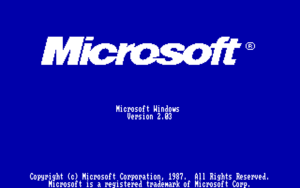Windows 2.x facts for kids
 |
|
| Developer | Microsoft |
|---|---|
| OS family | Microsoft Windows |
| Source model | Closed source |
| Released to manufacturing |
December 9, 1987 |
| Latest release | 2.11 / March 14, 1989 |
| Repository |
|
| License | MS-EULA |
| Preceded by | Windows 1.0 |
| Succeeded by | Windows 3.0 |
| Official website | http://www.microsoft.com/ |
| Support status | |
| Unsupported as of December 31, 2001 | |
Windows 2.x was a special kind of computer program called a graphical user interface (GUI). It was made by Microsoft for personal computers. Think of it as a way for you to see and click on things on your screen, instead of just typing commands.
This version of Windows was released in 1987. It was an update to the earlier Windows 1.0. People said it looked a lot like the first Mac OS (Apple's computer system).
Contents
What is Windows 2.x?
Windows 2.x was not a full operating system like Windows 10 or macOS today. Instead, it was an "operating environment." This means it ran on top of another operating system, usually DOS. It added a visual layer to DOS, making computers easier to use.
With Windows 2.x, you could:
- See icons and windows on your screen.
- Use a mouse to click and drag things.
- Run several programs at the same time.
Key Features of Windows 2.x
Windows 2.x brought some important changes compared to its older brother, Windows 1.0. One big improvement was that windows could now overlap each other. In Windows 1.0, windows could only be "tiled," meaning they sat side-by-side without covering each other.
This version also introduced important programs that are still around today, like Microsoft Word and Microsoft Excel. These were some of the first versions of these popular office tools.
Windows 2.1x: The Next Steps
After the first release of Windows 2.03, Microsoft quickly brought out newer versions. About five months later, they released Windows 2.10. Then, ten months after that, came Windows 2.11.
These newer versions were important because they needed more powerful computer chips to run. They were the first versions of Windows that required an Intel 80286 or Intel 80386 processor. These processors were faster and could handle more complex tasks than the older chips. This made Windows run smoother and allowed for more advanced software.
Windows 2.1x also made better use of the computer's memory. This was a big deal because it meant programs could run more efficiently.
The End of Support
Microsoft stopped supporting Windows 2.x on December 31, 2001. This means they no longer provided updates or help for people using this old system. Today, Windows 2.x is mostly a part of computer history, showing how far computers have come!
| Preceded by Windows 1.0 |
DOS-Based Microsoft Windows | Succeeded by Windows 3.0 |

